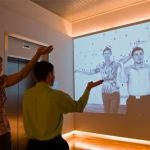first person
Field Notes from the Future of Publishing
At the Frankfurt Book Fair, Ed Finn and his team attempted to "write, edit, and publish a book in three days." In this essay, Finn explains the process, outcomes, and future considerations of that collaborative experiment in writing, reading, and publishing in parallel and as performance, in the same room at the same time, as he attempts to answer the question, "What is the future of publishing?"
Language as Gameplay: toward a vocabulary for describing works of electronic literature

Just as Walter Benjamin declared that all "great works of literature either dissolve a genre or invent one," Brian Kim Stefans argues that all successful works of electronic literature are sui generis and invent their own genre. There can be a vocabulary for this invention, however, and Stefans sets out “The Holy Grails of Electronic Literature,” “Six Varieties of Crisis,” and the “Surrealist Fortune Cookie.” Through these concepts, he describes the formal challenges, reading experiences, and fundamental textual units of electronic literature.
Critical Code Studies Week Five Opener – Algorithms are thoughts, Chainsaws are tools
Stephen Ramsay introduces a short film in which he does a live reading of composer Andrew Sorensen's performance "Strange Places" and provides commentary.
Critical Code Studies Conference- Week Five Discussion
David Shepard heads off the discussion regarding Stephen Ramsay's live reading of Andrew Sorensen's "Strange Places." His initial contribution is followed with posts by Amanda French, Mark Marino, Max Feinstein, Jeremy Douglass, Daren Chapin, John Bell, Jeff Nyoff, Jennifer Lieberman, and Stephen Ramsay, as well as Andrew Sorensen himself.
Lost and Long-Term Television Narrative
David Lavery ponders the "neo-baroque" tap-dancing of TV's most playful and commercially successful serial drama.